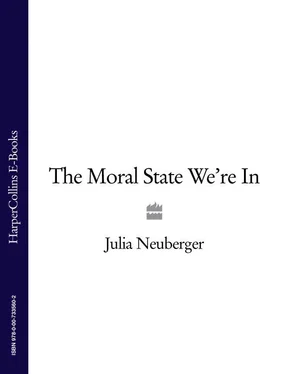1 ...7 8 9 11 12 13 ...21 The fear of litigation in the USA is real and is growing in the UK. Though actual litigation is less common than the fear of it might suggest, it does have a powerful effect on behaviour. In the USA it is that pressure that has led to an increasingly strong argument for individual patients to have their own advance directives. State statutes on treatment directives give physicians a guarantee of civil and criminal immunity if they withhold or withdraw life-sustaining treatment relying in good faith on a patient’s advance directive. So, the argument runs, encouraging the use of advance directives will lessen the chance of litigation, allow for real patient autonomy, and arguably save costs.
But, if we are to move to a system of advance directives, then, as a society, we have to think quite differently about our health and social care systems. For the first time, with the exception of palliative care and hospice services, we will have to give far greater thought to the question of suffering, for despite the success of the hospice movement, suffering is barely part of medical training in Britain. Public debate on these issues needs to be encouraged, and public standards established. The idea that patients could set out for themselves, perhaps on a standardised form, what they want to happen if they are too frail, or mentally incompetent, to make a decision, is an attractive one. It would take away from healthcare professionals the need always to make decisions ‘in the best interests’ of the person involved, since it is often hard to tell what those interests might be. And many people simply do not want, at the end of their days, someone striving officiously to keep them alive.
Yet the system is not yet established that would allow us, as standard practice, to make our views known to our GP or to the person acting on our behalf in the healthcare setting. It is remarkably good practice at present if GPs and healthcare professionals ask us our views and make a note of them for future use. A system of advance directives seems sensible, practical, and easy to organize once a decision has been reached about what questions should be asked. The courts already recognize living wills, but the new mental capacity legislation will enshrine the right to draw one up in law and make it possible to appoint a healthcare proxy, in exactly the same way appointing someone to look after one’s financial affairs. As well as enshrining the right to make a living will in law, the Bill creates a new criminal offence of neglect or ill treatment of a person who lacks mental capacity, but it met criticism early on from the Making Decisions Alliance, a grouping of charities including Age Concern and the Alzheimer’s Society, who argued that the provisions lacked teeth and did not give advocates a central role in representing those affected by mental incapacity. In June 2004, the numbers affected were some 700,000 with dementia, some 145,000 with severe and profound learning disabilities, and some 120,000 suffering from the long-term effects of severe brain injury, quite apart from those with episodic severe mental illness.
At this point, it might be worth returning to the story of the donkey, the dog, the cat and the cock–all of whom had outlived their usefulness to their owners. Evidence is mounting of the rationing of healthcare by age in the United Kingdom. Is this because the elderly are seen as being too old to be productive? Or simply that they are felt to have had their turn and are taking up resources that should be used for younger people? A King’s Fund study in 2001 found that three out of four senior managers believed that age discrimination existed in some form or other in services in their local area. Discrimination included policies restricting access to particular units or treatments, although age-related policies were thought to be on the decline. *
Discrimination and Rationing
The cost of caring for older people can only be contained if the general view is that it is morally right to do so, and that requires a public debate and a willingness to change on the part of the medical profession. Older people must not feel they are being denied care. But care in the future might be different from what they get at present. It could mean more palliative care for the relief of pain and suffering, more holistic and less scientifically driven care. Indeed, it might mean that care–rather than often futile attempts to cure–goes higher up the agenda.
This is the nub of one of the key issues facing the frail elderly and those of us concerned about their welfare. For what quality of life do patients enjoy after all the hi-tech healthcare? At present, nearly 29 per cent of all healthcare costs are concentrated on people in their last year of life (and, obviously, death rates rise with age). More dramatically, when looked at by age group, of all healthcare spending devoted to those aged 65–74, 43 per cent is devoted to those in their last year of life; for those aged 75–84 the figure is 56 per cent and for 85+ it is 65 per cent. *
It is hardly surprising that costs should be heavy in the last year of life, but if our true aim were to be the preservation of life at any cost, then we could certainly do more to keep old people alive than we do at present. For instance, are we keen to prescribe unpleasant chemotherapies for as yet incurable cancers, on the basis that our success rate is improving and one day they will work, as with the childhood leukaemias? Are we willing to say we will spend more on the life of a premature baby, a child or young person than on older people? Should we ration healthcare by age? Evidence exists for the rationing of care of people with coronary heart disease and cancer. Until recently, screening for breast cancer stopped at the age of 64. Now, women aged between 50 and 64 are routinely invited for breast screening every three years, and work has been carried out to extend the programme to women up to and including the age of 70 from the end of 2004.
One might argue that age criteria in breast screening have been in place because of lack of occurrence (in fact, incidence goes up with age) or because the life of a woman of, say, 70 who has advanced breast cancer has not been thought worth making an effort to save. Many experts argue that the cancer grows so slowly in older women that they will probably die of something else. But perhaps that is no longer the case with increased life expectancy. A woman of 70 is likely to be no longer economically active, yet it is also likely that she will be caring for an elderly husband or sibling–thus saving the state the cost of care. Is this not an economic activity? It may not increase GDP, but it certainly saves the state increased expenditure on social care.
The resource allocation arguments about rationing on the basis of age are well argued. The two positions are beautifully spelled out in the work of Professor Alan Williams of the Centre for Health Economics at the University of York, who is in favour of the use of age as a determinant for rationing decisions, and Professor Sir Grimley Evans, Professor of Clinical Gerontology at Oxford, who is strongly opposed. Williams argues *that there is a vain pursuit of immortality (true) and that people over 65 are a far larger proportion of the population than they ever were. That is a point well taken. He argues that as we get older we accumulate a ‘distressing collection of chronic incurable conditions’. Some are a nuisance, but some are serious, involving disability and pain. Though most are incurable, that does not imply that they are untreatable. We also get more problems with acute conditions such as pneumonia and flu, and find it difficult to recover from what younger people take in their stride, like a fall. Hence healthcare expenditure on older people is comparatively so large.
Читать дальше






![Nicholas Timmins - The Five Giants [New Edition] - A Biography of the Welfare State](/books/701739/nicholas-timmins-the-five-giants-new-edition-a-thumb.webp)





